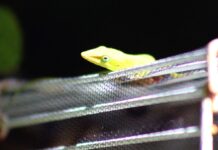
The board of the Florida Keys Mosquito Control District has decided to defer its vote on the Oxitec genetically modified mosquito experimental trial to its August meeting, currently scheduled for Tuesday, Aug. 18.
“We expect the format to be similar to Tuesday’s meeting with public comment and subsequent action taking place at 5 p.m.,” said FKMCD spokesperson Chad Huff.
The meeting agenda will be posted at keysmosquito.org/board-meetings in the next several days. Those proceedings and the rest of the board business will be available via livestream.
On Monday, Barry Wray of the Florida Keys Environmental Coalition unveiled a billboard in the Upper Keys (MM 92.5) opposing the trial. The billboard reads: “WARNING!!! GENETICALLY MODIFIED MOSQUITOES TO BE RELEASED IN THE KEYS!!!” and lists a website, stopgmm.com.
Last week, two groups hosted virtual meetings with a panel of experts.
The Center for Food Safety and Friends of the Earth presented on July 13 with panelists from Yale University, GeneWatch UK, Dr. John Norris of the Lower Keys Medical Center and Ed Russo of the Florida Keys Environmental Coalition.
On the following day, the FKMCD hosted a virtual meeting with panelists from the National Association of County and City Health Officials; Bob Eadie, health administrator for the state Department of Health in Monroe County; veterinarian Dr. Doug Mader; and a professor from the University of Florida’s medical entomology laboratory.
Oxitec’s experimental trial proposal has been cleared by federal and state officials. Oxitec has been courting the keys and FKMCD for more than a decade. Whether or not the trial takes place is up to a vote by the board of the FKMCD. Oxitec says its technology can decrease the chances of mosquito-borne diseases such as dengue fever — in 2020, Monroe County has confirmed 16 cases — and zika.
In both versions of the technology, Oxitec takes a biologically modified mosquito and uses tetracycline to keep it alive to adulthood so that it can mate. A very basic layman’s explanation of the procedure is to say that when the tetracycline applications stop (when the mosquitoes are released into the wild), the mosquitoes and offspring die. In the 2nd generation technology, only female breeders are treated with tetracycline in the lab in the U.K. Then the male-only eggs can be shipped globally for distribution. Boxes of the male-only eggs can be placed in neighborhoods. Once in place, water and fluorescent markers are added to the boxes.
“Do we really want to be the home of the genetically modified mosquito experiment?” said Wray. “At a time when we are already battling one public health pandemic, we should not be experimenting on the environment, the public health, and must stop any experimenting that could cause another devastating impact on our local economy. We need solutions that are supported by sound science, transparency, and which are going to be sustainable for both our fragile and unique ecosystems, our economy, and least risky for people. The community does not consent to being lab rats in this experiment.”
On June 23, the FKMCD held a virtual meeting with key personnel from Oxitec, as well as Monroe County Health Officer Bob Eadie, to bring the Keys up to speed on the company’s second-generation technology it proposes to try in the Keys.
Eadie, the Keys’ top health administrator, endorsed the trial.
“You can never have enough tools,” he said, referring to the Oxitec technology. “As we go forward we need to figure out how to control any type of outbreaks of infectious diseases. I go back to COVID. It’s possible we can create a vaccine for that, but decades of trials for a dengue vaccine have not been successful. We need some way to protect the public from mosquito-borne diseases and this looks like viable technology.”



















